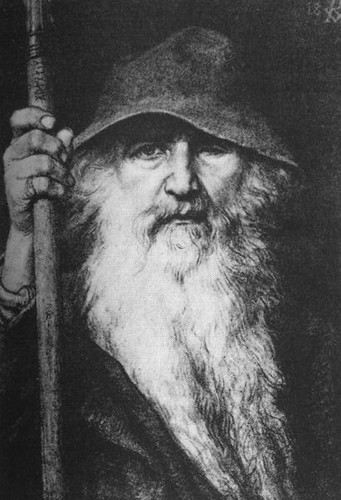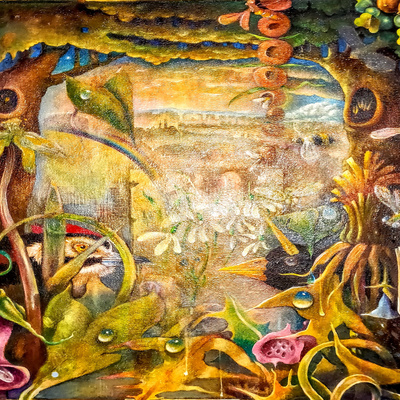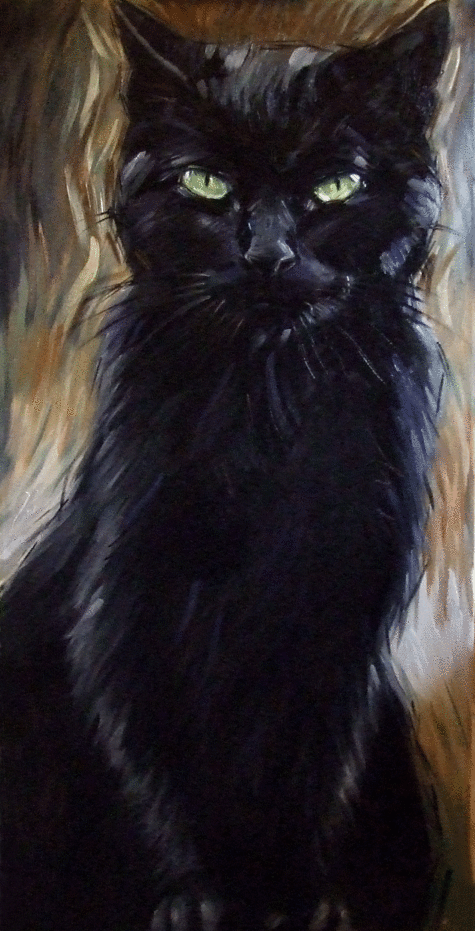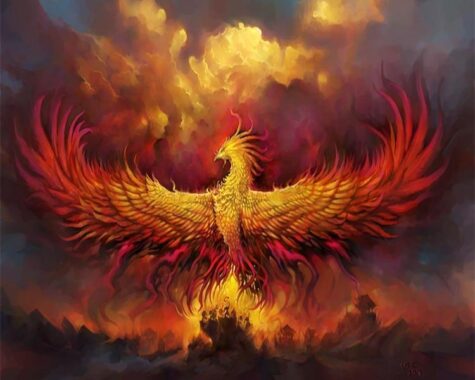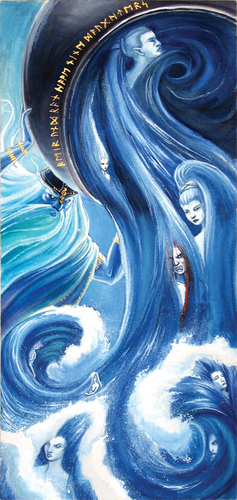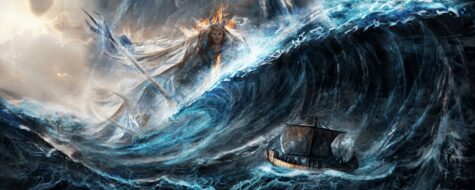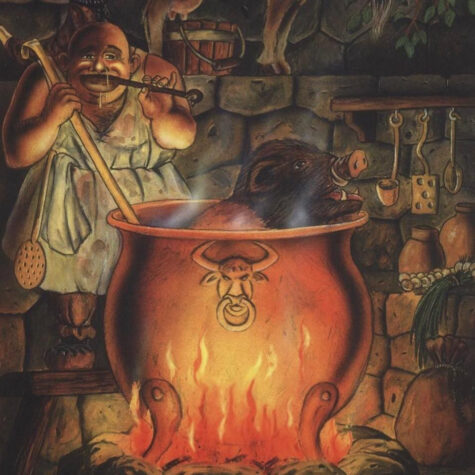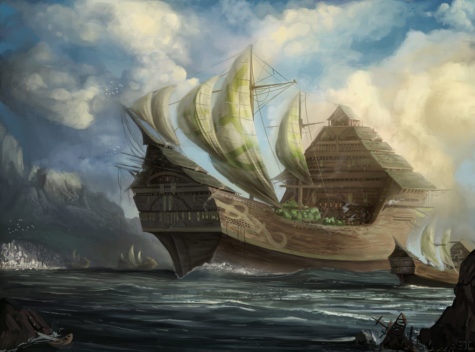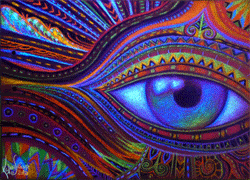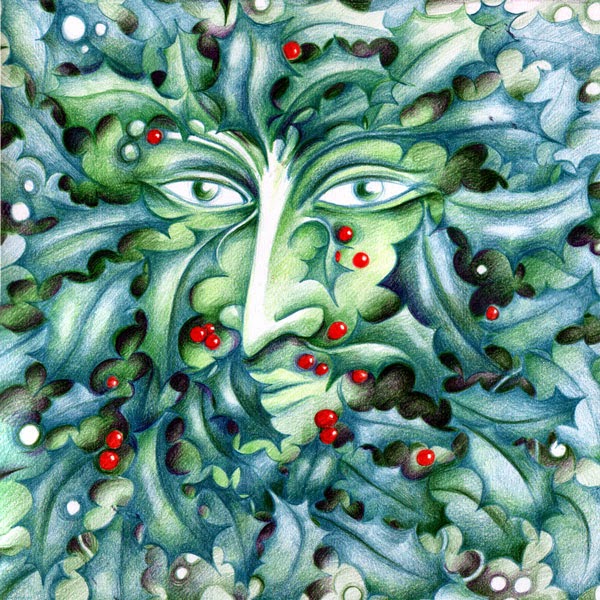Myths and Legends
An Alternative Odin Story
Odin: The Norse Biggy. Odin is Father of the Gods, King of Asgard, Ruler of the Aesir and the Lord of War, Death and Knowledge. To travel the world without being recognized, he wears a huge wide-brimmed hat. He also — thanks to Loki — rides an eight-legged horse named Sleipnir into battle. All he needs is a six-shooter and a sheriff’s badge to be able to stand in for John Wayne in True Grit.
His biggest fans include the Berserkers, which should give you some idea. He’s also very hot on Knowledge and Military Intelligence, having two ravens, Huginn and Muninn, who fly around the world every day bringing up-to-date reports.
Odin himself has only one eye, having traded the other one for a sip from Mimir’s Well of Wisdom during his visit to the great World Tree Yggdrasil. Consequently he’s full of knowledge, while his missing eye is hidden in an unknown location care of Mimir the Talking Head. The eye enabled Mimir to focus on far-distant events, allowing Odin the ability to always see far ahead.
To become the Top Wise Guy, Odin put himself through some incredibly rigorous ordeals. The Well of Wisdom lies under the second root of Yggdrasil, which allows the Dew of Knowledge to seep into it. So Odin stabbed himself with his own spear and hung himself on the tree for nine days and nights. He was then allowed a peep, and saw magic runes appear on rocks beneath him. With a superhuman effort he struggled to lift them, which must have been quite an acrobatic feat. Running his eye over the mystic symbols, he was instantly freed of all encumbrances; restored and rejuvenated with everlasting vigor enabling him to drop lightly to the ground.
His ordeal accomplished, Odin was at last able to take a well-deserved swig from Mimir’s well, making him well-wise as well as wise. It was even tastier than his usual tipple Kvas, the Mead of Inspiration, a special brew made from the blood of Kvasir. If you think a wise one-eyed Norse cowboy on an eight-legged horse would be easy to recognize, this ain’t necessarily so for Odin is a shape-changer, and his range of disguises make Sherlock Holmes look like Miss Marple. He also travels incognito under a variety of false names.
Sharing primeval God status with brothers Ve and Vili, the Great Odin helped bring the world as we know it into being, so we can forgive his little foibles. The legend tells that in the ice-laden wastes of Niflheim, he got into a rather catastrophic snowball fight with Ymir, the king of the Frost-Giants. The Abominable Snow Giant was slashed into pieces and Odin made the world from all the bits. He even found a use for the eyebrows. Odin’s dad is Bor, son of Buri, son of an ice cube. Married to Frig (with the occasional Freya fling and flirtation with Rind).
Sith Code ~ Version 2
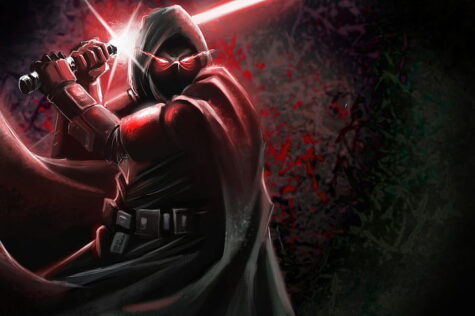
Peace is a lie
There is only passion
Through passion I gain strength
Through strength I gain power
Through power I gain victory
Through victory my chains are broken
The Force shall set me free
Code of the Sith
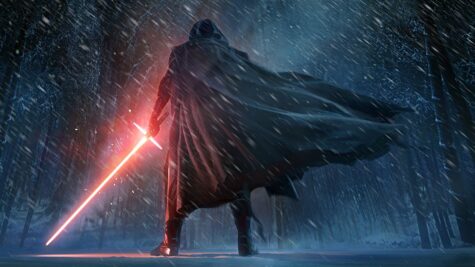
There is no peace, there is anger.
There is no fear, there is power.
There is no death, there is immortality.
There is no weakness, there is the Dark Side.
I am the Heart of Darkness.
I know no fear,
But rather I instill it in my enemies.
I am the destroyer of worlds.
I know the power of the Dark Side.
I am the fire of hate.
All the Universe bows before me.
I pledge myself to the Darkness.
For I have found true life,
In the death of the light.
Who is Odin?
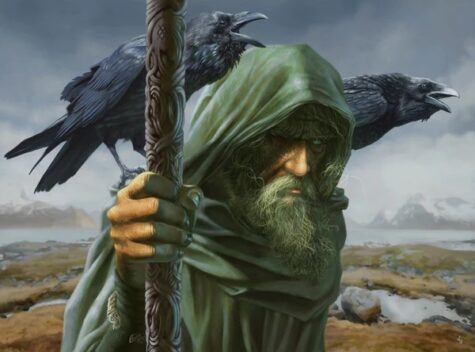
ODIN (Woden to the Anglo-Saxons) is a god of the mysterious realms of wisdom, cunning, sorcery, and death. Subtle, aristocratic, and at times inexplicable, Odin is the literal father of important gods, such as Thor, and All-Father to the whole of creation, divine and human. Amongst his gifts was the greatest of all: the gift of writing. To accomplish this Odin hung himself upside down upon the World Tree, the gigantic ash Yggdrasil ( a compound meaning “terrible horse”). After nine days of fasting and agony, in which “he made of himself a sacrifice to himself”, he “fell screaming” from the tree, having had revealed to him in a flash of insight the secret of the runes. Their initial manifestation took the form of eighteen powerful charms for protection, increase, success in battle and love-making, healing, and mastery over natural causes.
This story illustrates an important dynamic of the Northern pantheon, which did not allow for omnipotence: even Odin must pay his due. At Mimir’s well, which lay deep under the roots of Yggdrasil, the World Tree, the god had earlier chosen to undergo an important forfeit. Odin paid with one eye for a single drink of the enchanted water. His mouthful granted him wisdom and fore-sight. It is due to this sacrifice that Odin’s face is depicted with a straight line indicating an empty eye, or alternately, in a wide-brimmed hat pulled down low over the missing orb.
His quest for knowledge was never-ending. Upon his shoulders perched two ravens, Hugin (“Thought”), and Munin (“Memory”). These circled the Earth each day, seeing all, and then at night reported to Odin what they had learnt. He cherished them both, but particularly Munin, which seems to underscore the importance he placed on rune writing, record keeping, and honouring the heroic deeds of the past.
There is another bird associated with Odin, the eagle. The god often transformed himself into this canny raptor, both to view the workings of the world and to intervene when an avian form was better suited to his ends.
Odin’s fabulous grey horse Sleipnir (“Slippery One”) was like no other. This eight-legged horse was the offspring of a giant’s magical stallion and the “trickster” god, Loki, who disguised himself as an alluring mare to distract the stallion from the task of building a wall around Asgard, home of the Gods. If the wall had been completed by a certain date, Freyja, the goddess of beauty, war and sexuality would have been forfeit to the giant as payment for his labours. (The gods also stood to lose the Sun and the Moon, but did not seem particularly concerned about their impending loss!)
Loki was successful, but vanished for a few seasons as he had to bear the fruit of his trickery. He returned to Odin leading his equine offspring, which he presented as a gift. With his eight legs, Sleipnir could run twice as fast as ordinary steeds, and it is he who carries the valiant dead from the battle field to Valhalla.
In this realm warriors fought all day yet never died from their wounds, were made whole again in time for supper, at which they feasted upon the flesh of a similarly eternal magical boar who was born anew each day. Intoxicating mead filled their drinking horns, and the many-room hall rang with the song of the victorious rewarded there. Not a bad end for a pragmatic folk who lived and died by their iron.
For an alternative look at Odin, check out this post.
A Field of Flowers
The lotus grows quietly in the garden pool. The ibis curls one foot beneath him and blinks. It is too nice a day to spoil with words.
In the wind I hear what I see ~ a low hum of vitality, the bell of flowers ringing. I pass in and out of time, eons press against my skin. I rest in a place within a place, a meadow of myself that is the world pressing close. The river flows on. Tall, thin reeds rock against the current, and the wind like a woman envelops me.
Life is liquid, cleansing, nourishing. I lie in the white mind of universe; knowing what I know, it knows me.
The fruits of the land are abundant. With the quick, bright blade of spirit I turned new ground, planted seed. I struggled with the donkey. Beneath my hand things happened ~ grapes and wheat. In time I drank wine and ate bread.
The field ploughed feeds a man, the spirit cultivated nourishes. I keep one eye on heaven and one on earth, following the seasons, walking the rhythm.
I lie on sweet hay. The sparrow’s song cuts the silence. I hear it now as I heard it ages ago. The birds are Gods. I carry their song in my belly. I am carried in the egg of silence. Even now in the long pause of possibility, quiet beneath its shell, there rises a wild honking, long flights against an autumn moon, smooth eggs waiting to be laid. An old may lying in a field feels embryonic.
Learning peace itself is a struggle. More often I know the air as it whips my face. When the wind is still, I forget the wind. Walking through town, I turn longingly to the mountain. On the mountain I gaze back on the town. When there’s much talk I withdraw into silence. When it is quiet I strain to hear some song. Having no trouble, I create some to keep the day interesting. We misunderstand the quiet. In the heat of the day I seek shadows. At night I praise the light of stars.
The moon grows legs and wanders through an old man’s heart seeking some dark corner to inspire. At midday the Gods walk through town invisible as cats. Only children and wise old men know the difference.
Even night and day struggle, make peace between themselves. We call that beautiful sunset and dawn. In the spirits of men we call it a state of grace. Unless the earth enveloped the seed and the seed struggled against the darkness, there would be no corn.
The moment we are born we begin to die. In each death we are born again. We take in the air and the air escapes us. Call it the breath of life. I no longer call loss disaster. It is the empty heart waiting to be filled. From the act of love, two bodies straining against each other, there rises the star of children. After opposition comes unity. Knowing that removes the sting of failure.
What God wants God shall have, and so I say, make it easy on yourself. The Divine Will asks only that things happen, that what it asks to exist comes to pass. My desire, my little will gives it form. If I struggle it comes anyway, malformed, a lesser power than it should be. If I give myself to it, it passes through me and I nourish it as it nourishes me.
The difference is in the knowing of it. If there is confusion, I have not allowed life, the will of God, to change me. If I know it, I am changed by it. I have ferried myself across the churning waters of emotion. I go with the current; I rock to and fro in the tide. I come to a place I never knew I was bound for. There is a reason for accidents.
When I open my mouth I let the Gods speak and it is like sparrows singing. When I open my heart I find the way, a gap through the wall of mountains. Through me I allow the world to unfold. I have the magick of earth, wind and flame.
Though the future lies shrouded in veils, if I give my will to what I know not, I shall see it all come to pass. No sorrow. No sweat. Knowing the world is as the world should be, I enter the fields of peace.
~From: Awakening Osiris
Ra Takes The Form Of A Cat
There was a day when darkness gathered itself into a hungry snake and crawled upon the earth. On her belly she crept toward the city of light, swallowing whatever lay in her path: Men and women, beasts, vegetables and Gods. And no thing that touched her lips escaped her, for all matter was lost in the darkness.
That was the day, or rather the night, that Ra left the sky and took his shape in the cat. To fool the snake, he slept under the leathery leaves of the laurel, holding in his strength, stirring only once for a single languid lick of his paws to brush against his whiskers.
Seeing the cat ~ that tasty bit of flesh, the snake slithered over and opened its mouth. On the other side of her teeth swelled the void, the abyss, the great nothing, and from it issued the cries of all the lost things of creation. Their voices were a wailing wind that beckoned from the darkness.
Then the soul of Ra in the form of a tiny cat leapt up beneath the shade of the laurel and, with teeth of iron and gold, he snapped off the head of the snake and sliced its body into a thousand pieces and swallowed them up.
Blood from the snake’s mouth spilled onto the ground. In that manner Ra’s creations returned to earth. The blood seeped into the ground and was taken up by the thirsty laurel, which burst into bloom with the souls of the dead in the shape of yellow flowers.
Now leaning down from the east edge of heaven, the God of words had witnessed the battle. He had felt each puncture of the snake’s teeth upon his own throat and praised the cat which had given its shape to Ra.
“How like the God that made him is the radiant cat. How he slew the darkness with his mouth!” And Mau became the cat’s name and the God gave him words of power.
I have stood on the eastern bank beneath that flowering laurel ~ it is old now; its roots gnarled but still bursting with life ~ and I have gazed at the sky seeing daily the same battle. The sun rises. Light overcomes darkness and the high pink clouds of morning are tinged with the blood of the snake.
I am like that cat, overcoming my own darknesses. The soul duels fear and doubt and inertia, for these are the children of the snake, the worms hidden in the clay of being that would gnaw a man to death even while he lived.
I am that cat. I stand up and fight. I struggle with the evils of my own petty insistence. The battle of old Gods wages in my. I am a creature of history ~ human and divine. I am the scroll of numerous myths, one teller of a single story.
Now the sun rises as the gold egg of God, whole light of the world, saffron cake of being. Ra shines from his disk in heaven. He rises up ~ a golden wonder, a bead on the throat of sky. Gusts of wind issue forth as warm breath of his mouth and drive the boats along the water, sails the sun over a river of sky and enlivens the nostrils of his people.
He rises, making plain the two worlds of heaven and earth. I see myself by the light of my becoming.
~ From Awakening Osiris
Becoming The Phoenix
I flew straight out of heaven, a mad bird full of secrets. I came into being as I came into being. I grew as I grew. I changed as I change. My mind is fire, my soul fire. The cobra wakes and spits fire in my eyes.
I rise through ochre smoke into black air enclosed in a shower of stars. I am what I have made. I am the seed of every God, beautiful as evening, hard as light. I am the last four days of yesterday, four screams from the edges of the earth ~ beauty, terror, truth, madness ~ the phoenix on his pyre.
In a willow I made my nest of flowers and snakes, sandalwood and myrrh. I am waiting for eternity. I’m waiting for four hundred years to pass before I dance on flame, turn this desert to ash, before I rise, waking from gold and purple dreams into the season of God.
I will live forever in the fire spun from my own wings. I will suffer burns that burn to heal. I destroy and create myself like the sun that rises burning from the east and dies burning in the west.
To know the fire, I become the fire. I am power. I am light. I am forever. On earth and in heaven I am. This is my body, my work. This is my deliverance.
The heat of transformation is unbearable, yet change is necessary. it burns up the useless, the diseased. Time is a cool liquid, it flows away like a river. We shall see no end of it.
Generation after generation, I create myself. It is never easy. Long nights I waited, lost in myself considering the stars. I wage a battle against darkness, against my own ignorance, my resistance to change, my sentimental love for my own folly. Perfection is a difficult task.
I lose and find my way over again. One task done gives rise to others. There is no end to the work left to do. That is harsh eternity. There is no end to becoming. I live forever striving for perfection.
I praise the moment I die in fire for the veils of illusion burn with me. I see how hard we strive for truth, and once attained, how easily we forget it. I hold that fire as long as I can. My nose fills with the smell of seared flesh, the acrid smoke of death, so that years from now I might look on that scar and remember how it was to hold the light, how it was to die and come again radiant as light walking on sand.
I change and change again, generation after generation. I find anguish then peace.
I am satisfied with my birth and the fate to which it led me. I do not regret the discomforts and terrors of my mortality any more than I regret the company of angels. I have entered fire. I become invisible, yet I breathe in the flow of sun, in the eyes of children, in the light that animates the white cliffs at dawn.
I am the God in the world in everything, even in darkness. If you have not seen me there, you have not looked. I am the fire that burns you, that burns in you. To live is to die a thousand deaths, but there is only one fire, one eternity.
~From Awakening Osiris
Aegir’s Feast
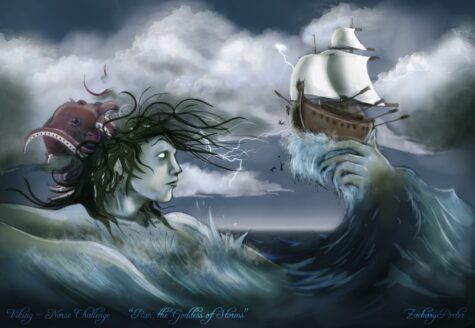
Ægir was the ruler of the ocean, and his home was deep down below the tossing waves, where the water is calm and still. There was his beautiful palace, in the wonderful coral caves; its walls all hung with bright-colored seaweeds, and the floor of white, sparkling coral sand. Such wonderful sea-plants grew all about, and still more wonderful creatures, some, which you could not tell from flowers, waving their pretty fringes in the water; some sitting fastened to the rocks and catching their food without moving, like the sponges; others darting about and chasing each other.
“Deep in the wave is a coral grove,
Where the purple mullet and goldfish rove;
Where the sea-flower spreads its leaves of blue,
That never are wet with falling dew,
But in bright and changeful beauty shine
Far down in the green and glassy brine.
The floor is of sand, like the mountain drift,
And the pearl-shells spangle the flinty snow;
From coral rocks the sea-plants lift
Their boughs where the tides and billows flow.
The water is calm and still below,
For the winds and waves are absent there,
And the sands are bright as the stars that glow
In the motionless fields of upper air.”
—Percival.
In that ocean home lived the lovely mermaids, who sometimes came up above the waves to sit on the rocks and comb their long golden hair in the sunshine. They had heads and bodies like beautiful maidens, with fish-tails instead of feet.
One day the gods in Asgard gave a feast, and Ægir was invited. He could not often leave home to visit Asgard, for he was always very busy with the ocean winds and tides and storms; but calling his daughters, the waves, he bade them keep the ocean quiet while he was away, and look after the ships at sea.
Then Ægir went over Bifröst, the rainbow bridge, to Asgard, where they had such a gay party and such feasting that he was sorry when the time came to go home; but at last he said good-by to Father Odin and the rest of the Æsir.
He thanked them all for the pleasure they had given him, saying, “If only I had a kettle that held enough mead for us all to drink, I would invite you to visit me.”
Thor, who was always glad to hear about eating and drinking, said, “I know of a kettle a mile wide and a mile deep; I will fetch it for you!”
Then Ægir was pleased, and set a day for them all to come to his great feast.
So Thor took with him his brother, the brave Tyr, who knew best how to find the kettle; and together they started off in Thor’s thunder chariot, drawn by goats, on their way to Utgard, the home of the giants.
When they reached that land of ice and snow, they soon found the house of Hymir, the giant who owned “Mile-deep,” as the big kettle was called. The gods were glad to find that the giant was not at home, and his wife, who was more gentle than most of her people, asked them to come in and rest, advising them to be ready to run when they should hear the giant coming, and to hide behind a row of kettles which hung from a beam at the back end of the hall.
“For,” said she, “my husband may be very angry when he finds strangers here, and often the glance of his eye is so fierce that it kills!”
At first the mighty Thor and brave Tyr were not willing to hide like cowards; but at last they agreed to the plan, upon the good wife promising to call them out as soon as she had told her husband about them.
It was not long before they heard the heavy steps of Hymir, as he came striding into his icy home; and very lucky it was for Thor and Tyr that the giantess had told them to hide, for when the giant heard that two of the Æsir from Asgard were in his home, so fierce a flash shot from his eyes that it broke the beam from which the kettles hung, and they all fell broken on the floor except Mile-deep.
After a while the giant grew quiet, and at last even began to be polite to his guests. He had been unlucky at his fishing that day, so he had to kill three of his oxen for supper. Thor being hungry, as usual, made Hymir quite angry by eating two whole oxen, so that, when they rose from the table the giant said, “If you keep on eating as much at every meal, as you have to-night, Thor, you will have to find your own food.”
“Very well,” said Thor; “I will go fishing with you in the morning!”
Next morning Thor set forth with the giant, and as they walked over the fields toward the sea, Thor cut off the head of one of the finest oxen, for bait. Of course you may know that Hymir was not pleased at this, but Thor said he should need the very best kind of bait, for he was hoping to catch the Midgard serpent, that dangerous monster who lived at the bottom of the ocean, coiled around the world, with his tail in his mouth.
When they came to the shore where the boat was ready, each one took an oar, and they rowed out to deep water. Hymir was tired first, and called to Thor to stop. “We are far enough out!” he cried “This is my usual fishing-place, where I find the best whales. If we go farther the sea will be rougher, and we may run into the Midgard serpent.”
As this was just what Thor wanted, he rowed all the harder, and did not stop until they were far out on the ocean; then he baited his hook with the ox’s head, and threw it overboard. Soon there came a fierce jerk on the line; it grew heavier and heavier, but Thor pulled with all his might. He tugged so hard that he broke through the bottom of the boat, and had to stand on the slippery rocks beneath.
All this time the giant was looking on, wondering what was the matter, but when he saw the horrid head of the Midgard serpent rising above the waves, he was so frightened that he cut the line; and Thor, after trying so hard to rid the world of that dangerous monster, saw him fall back again under the water; even Miölnir, the magic hammer, which Thor hurled at the creature, was too late to hit him. And so the two fishermen had to turn back, and wade to the shore, carrying the broken boat and oars with them.
The giant was proud to think he had been too quick for Thor, and after they reached the house he said to the thunder-god, “Since you think you are so strong, let us see you break this goblet; if you succeed, I will give you the big kettle.”
This was just what Thor wanted; so he tightened his belt of strength, and threw the goblet with all his might against the wall; but instead of breaking the goblet he broke the wall.
A second time he tried, but did no better. Then the giant’s wife whispered to Thor, “Throw it at his head!” And she sang in a low voice, as she turned her spinning-wheel,—
“Hard the pillar, hard the stone,
Harder yet the giant’s bone!
Stones shall break and pillars fall,
Hymir’s forehead breaks them all!”
Yet again Thor threw the goblet, this time against the giant’s head, and it fell, broken in pieces.
Then Tyr tried to lift the Mile-deep kettle, for he was in a hurry to leave this land of ice and snow; but he could not stir it from its place, and Thor had to help him, before they could get it out of the giant’s house.
When Hymir saw the gods, whom he hated, carrying off his kettle, he called all his giant friends, and they started out in chase of the Æsir; but when Thor heard them coming he turned and saw their fierce, grinning faces glaring down at him from every rocky peak and iceberg.
Then the mighty Thunderer raised Miölnir, the hammer, above his head, and hurled it among the giants, who became stiff and cold, all turned into giant rocks, that still stand by the shore.
Ægir was very glad to get Mile-deep; so he set to work to make the mead in it, to get ready for the great feast, at the time of the flax harvest, when all the Æsir were coming from Asgard to visit him.
Before the day came, all light and joy had gone from the sacred city, because the bright Baldur had been slain, and the homes of the gods were dark and lonely without him. So they were all glad to visit Ægir, to find cheer for their sadness.
There was Father Odin, with his golden helmet, and Queen Frigga, wearing her crown of stars, golden-haired Sif, Freyja, with Brisingamen, the wonderful necklace, and all the noble company of the Æsir, all except mighty Thor, who had gone far away to the giant-land.
As they all sat in Ægir’s beautiful ocean hall, drinking the sweet mead, and talking together, Loki came in and stood before them; but, finding he was not welcome, and no seat saved for him, he began saying ugly things to make them all angry, and at last he grew angry himself, and slew Ægir’s servant because they praised him.
The Æsir drove him out from the hall, but once more he came in, and said such dreadful things that at last Frigga said, “Oh, if my son Baldur were only here, he would silence thy wicked tongue!”
Then Loki turned to Frigga, and told her that he himself was the very one who had slain Baldur. He had no sooner spoken than a heavy peal of thunder shook the hall, and angry Thor strode in, waving his magic hammer. Seeing this, the coward Loki turned and fled, and Asgard was rid of him forever.
Source: Fairytalez
Farewell Song To Northland
As the years passed Wainamoinen
Recognized his waning powers,
Empty-handed, heavy-hearted,
Sang his farewell song to Northland,
To the people of Wainola;
Sang himself a boat of copper,
Beautiful his bark of magic;
At the helm sat the magician,
Sat the ancient wisdom-singer.
Westward, westward, sailed the hero
O’er the blue-back of the waters,
Singing as he left Wainola,
This his plaintive song and echo:
“Suns may rise and set in Suomi,
Rise and set for generations,
When the North will learn my teachings,
Will recall my wisdom-sayings,
Hungry for the true religion.
Then will Suomi need my coming,
Watch for me at dawn of morning,
That I may bring back the Sampo,
Bring anew the harp of joyance,
Bring again the golden moonlight,
Bring again the silver sunshine,
Peace and plenty to the Northland.”
~Kalevala / Rune 50 (John Martin Crawford translation)
When Words Were Magick
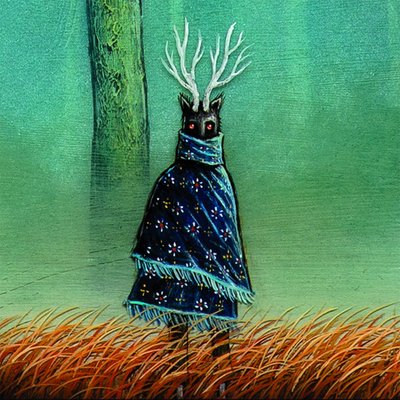
In the very earliest of times,
When both people and animals lived on the earth,
A person could become an animal if he wanted to
And an animal could become a human being.
Sometimes they were people
And sometimes animals
And there was no difference.
All spoke the same language.
That was a time when words were like magic.
The human mind had mysterious powers.
A word spoken by chance
Might have strange consequences.
It would suddenly become alive
And what people said wanted to happen
Could happen ~
All you had to do was say it
Nobody could explain this:
That’s the way it was.
~An Old Eskimo story found at Feathers and Bones
James Cheney: Invocation To The Dark Mother
Daniel: Prayer Before The Final Battle
blessed obyno: Queen of Ghosts
blessed obyno: Queen of Ghosts
Caerlion Arthur: The Great, Bloody and Bruised Veil of the World
